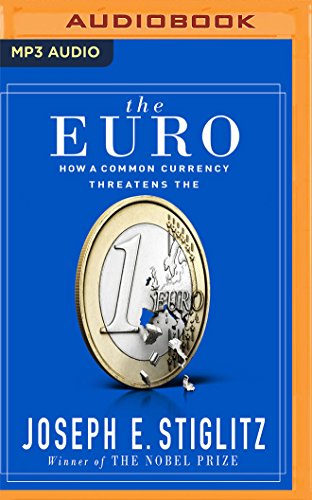
Can Europe prosper without the euro?
In 2010, the 2008 global financial crisis morphed into the “eurocrisis”. It has not abated. The 19 countries of Europe that share the euro currency – the eurozone – have been rocked by economic stagnation and debt crises. Some countries have been in depression for years while the governing powers of the eurozone have careened from emergency to emergency, most notably in Greece.
In The Euro, Nobel Prize-winning economist and best-selling author Joseph E. Stiglitz dismantles the prevailing consensus around what ails Europe, demolishing the champions of austerity while offering a series of plans that can rescue the continent – and the world – from further devastation.
Hailed by its architects as a lever that would bring Europe together and promote prosperity, the euro has done the opposite. As Stiglitz persuasively argues, the crises revealed the shortcomings of the euro. Europe’s stagnation and bleak outlook are direct results of the fundamental challenges in having a diverse group of countries share a common currency – the euro was flawed at birth, with economic integration outpacing political integration. Stiglitz shows how the current structure promotes divergence rather than convergence. The question, then, is: Can the euro be saved?
After laying bare the European Central Bank’s misguided inflation-only mandate and explaining how eurozone policies, especially toward the crisis countries, have further exposed the zone’s flawed design, Stiglitz outlines three possible ways forward: fundamental reforms in the structure of the eurozone and the policies imposed on the member countries; a well-managed end to the single-currency euro experiment; or a bold, new system dubbed the “flexible euro”.
With its lessons for globalization in a world economy ever more deeply connected, The Euro is urgent and essential listening.

A Lot Of Policy Discussion While other reviewers have already laid out the outline and points of the book, I’ll focus on a description of what you can expect should you choose to pick up this volume for your own library. I’m a lay-person in economics, having studied in undergrad and taught for years as a tutor, but I’m NOT a scholar so I will withhold my opinion on whether the author is right/wrong with the ideas he offers.
Broad clear and thoughtful, but biased There are two Joseph Stiglitzes: the brilliant economist and the repetitive polemicist.
The Euro is Europe’s Major Problem – Today, many of the countries of Europe (France, Greece, Italy, Spain, U.K.) have an output/capita (adjusted for inflation) well below that prior to the ‘Great Recession of 2008.’The Euro was supposed to enhance commercial ties, erode borders and foster a spirit of collective interest – partly through economies of scale and comparative advantage. But in the 17 years since that currency came into existence, it has instead reinvigorated conflicts and a spirit of distrust while making economic…